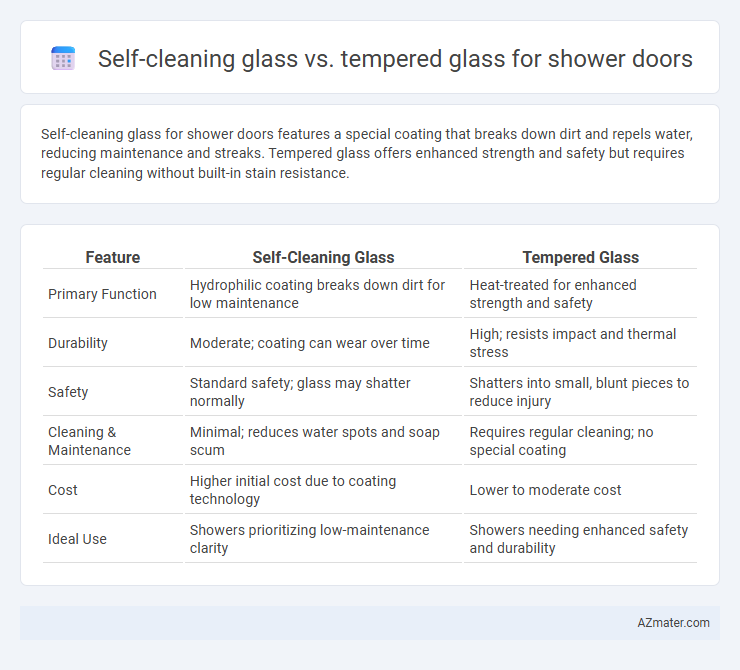Self-cleaning glass for shower doors features a special coating that breaks down dirt and repels water, reducing maintenance and streaks. Tempered glass offers enhanced strength and safety but requires regular cleaning without built-in stain resistance.
Table of Comparison
| Feature | Self-Cleaning Glass | Tempered Glass |
|---|---|---|
| Primary Function | Hydrophilic coating breaks down dirt for low maintenance | Heat-treated for enhanced strength and safety |
| Durability | Moderate; coating can wear over time | High; resists impact and thermal stress |
| Safety | Standard safety; glass may shatter normally | Shatters into small, blunt pieces to reduce injury |
| Cleaning & Maintenance | Minimal; reduces water spots and soap scum | Requires regular cleaning; no special coating |
| Cost | Higher initial cost due to coating technology | Lower to moderate cost |
| Ideal Use | Showers prioritizing low-maintenance clarity | Showers needing enhanced safety and durability |
Introduction to Shower Door Glass Options
Shower door glass options primarily include self-cleaning glass and tempered glass, each offering distinct benefits for bathroom use. Self-cleaning glass features a special coating that breaks down organic dirt and repels water spots, reducing maintenance efforts. Tempered glass is heat-treated for enhanced strength and safety, making it highly resistant to shattering and an ideal choice for durability in shower enclosures.
What is Self-Cleaning Glass?
Self-cleaning glass for shower doors features a special coating that breaks down organic dirt through photocatalysis when exposed to light, making maintenance easier by reducing soap scum and water spots. This glass utilizes a hydrophilic surface that allows water to spread evenly, washing away grime instead of forming droplets that cause streaks, unlike tempered glass which prioritizes safety and strength without self-cleaning properties. The advanced technology in self-cleaning glass enhances shower door hygiene and clarity, offering a low-maintenance alternative to traditional tempered glass.
Understanding Tempered Glass
Tempered glass is a type of safety glass processed by controlled thermal or chemical treatments to increase its strength compared to normal glass. It shatters into small, blunt pieces, reducing the risk of injury in case of breakage, making it ideal for shower doors. While self-cleaning glass offers low maintenance through photocatalytic coatings, tempered glass emphasizes durability and safety, essential for bathroom environments.
Key Features of Self-Cleaning Glass
Self-cleaning glass for shower doors features a special coating that uses sunlight to break down organic dirt and allows water to spread evenly, reducing water spots and soap scum buildup. This coating enhances durability by resisting stains and mineral deposits, maintaining clarity without frequent manual cleaning. Compared to tempered glass, which is valued primarily for safety and strength, self-cleaning glass prioritizes low maintenance and sustained transparency in humid bathroom environments.
Key Features of Tempered Glass
Tempered glass for shower doors offers enhanced safety due to its strength, shattering into small, blunt pieces rather than sharp shards when broken. It provides superior durability and resistance to thermal stress, preventing cracks caused by sudden temperature changes. Key features include its impact resistance, scratch resistance, and compliance with safety standards like ASTM C1048.
Durability Comparison: Self-Cleaning vs. Tempered Glass
Tempered glass offers superior durability with its heat-treated strength, making it highly resistant to impact and thermal stress, while self-cleaning glass primarily emphasizes low maintenance through its hydrophilic coating rather than enhanced toughness. The self-cleaning coating on glass does not compromise the inherent strength of tempered glass but may be more susceptible to surface scratches that could affect long-term performance. For shower doors, tempered glass ensures maximum safety and durability, while self-cleaning glass provides ease of cleaning without sacrificing the fundamental sturdiness required for daily use.
Maintenance and Cleaning Requirements
Self-cleaning glass for shower doors features a special photocatalytic coating that breaks down soap scum and water spots, reducing the frequency of manual cleaning required. Tempered glass, while highly durable and resistant to impact, lacks this coating, necessitating regular wiping and thorough cleaning to prevent mineral buildup and streaks. Choosing self-cleaning glass minimizes maintenance time and effort, enhancing long-term clarity and appearance with less frequent use of harsh cleaning agents.
Cost Analysis: Self-Cleaning vs. Tempered Shower Doors
Self-cleaning glass shower doors typically cost 20-30% more than tempered glass due to their specialized coating that reduces maintenance efforts. Tempered glass remains more budget-friendly upfront, averaging $300 to $600 per door, while self-cleaning glass ranges from $400 to $800 depending on size and brand. Long-term savings on cleaning products and labor can offset the initial premium of self-cleaning glass, making it a cost-effective choice for those prioritizing ease of maintenance.
Aesthetic Differences and Design Flexibility
Self-cleaning glass offers a sleek, clear surface with minimal water spots, enhancing shower door aesthetics by maintaining a spotless, transparent look over time. Tempered glass provides more design flexibility with options for frosted, patterned, or tinted finishes that add privacy and style variety to bathroom interiors. While self-cleaning glass emphasizes low maintenance and brilliance, tempered glass excels in customizable visual effects and impact resistance for diverse design preferences.
Which Glass is Best for Your Shower Door?
Self-cleaning glass uses a special coating that breaks down organic dirt and repels water, reducing maintenance and ensuring clearer visibility for longer periods, making it ideal for those seeking low-maintenance shower doors. Tempered glass, engineered through heat treatment for enhanced strength and safety, resists shattering and is highly durable, providing excellent protection in shower environments prone to impacts or thermal stress. Choosing the best glass depends on whether ease of cleaning or maximum safety and durability is the priority for your shower door installation.

Infographic: Self-cleaning glass vs Tempered glass for Shower door
 azmater.com
azmater.com